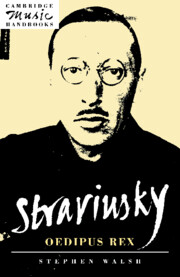Book contents
4 - How it all came to be known
Published online by Cambridge University Press: 18 December 2009
Summary
To turn from the external politics of the creation of Oedipus rex to the actual process of composition as shown by the composer's sketches and drafts is to follow Plato from the superficial world of shadow and illusion into the deeper reality of ultimate forms. This is a familiar experience to students of Stravinsky's sketchbooks. They reveal a mentality completely absorbed by the act of discovery, as described so vividly, a few years later, in the third Harvard lecture: ‘we grub about in expectation of our pleasure, guided by our scent, and suddenly we stumble against an unknown obstacle. It gives us a jolt, a shock, and this shock fecundates our creative power.’ Stravinsky nearly always grubbed at the piano, but whenever he encountered ‘something unexpected’, he would write it down.
The sketches are thus a record not so much of arduous labour, as with Beethoven or Mahler, as of moments of recognition or, to use Stravinsky's own term, ‘observation’. Page by page, the work in hand materialises on paper in the form of precise musical images that differ little in essence from their appearance in the finished score. Hardly anything goes unused. Once notated, an idea will be refined in various ways. From time to time, its elements may be arranged in slightly altered sequence; barring, articulation, verbal underlay and other secondary details may well be modified or added, melodic intervals may change.
- Type
- Chapter
- Information
- Stravinsky: Oedipus Rex , pp. 67 - 78Publisher: Cambridge University PressPrint publication year: 1993



